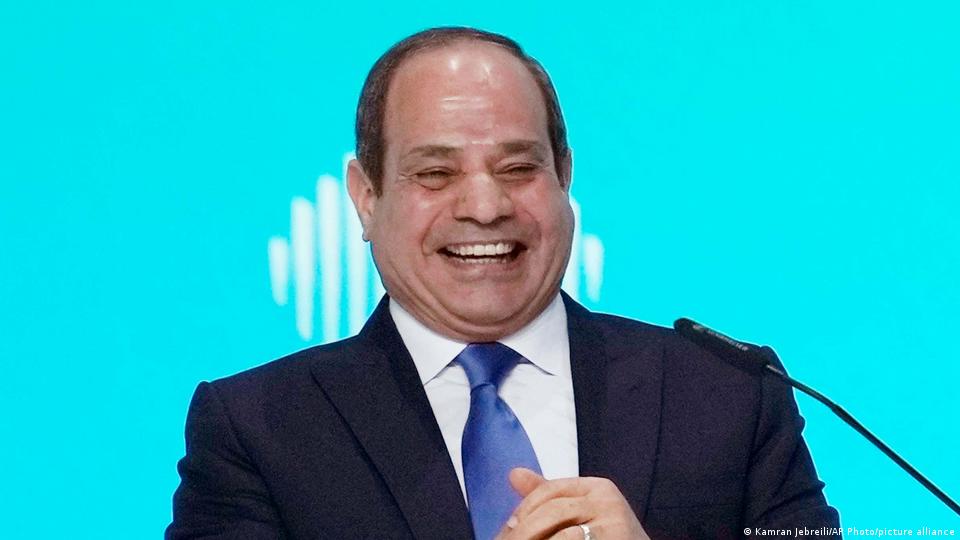By DW –
Inflation, IMF demands and the end of unconditional funds from the Gulf states mean Egypt needs foreign investments. But military-run trademark projects could hamper any real upswing.
At this week’s World Government Summit in Dubai, Egyptian President Abdel-Fattah el-Sissi said that “Egypt needs a trillion-dollar budget each year. Do we have that money? No. Do we have half of it? No. Do we have a quarter of it? No.” He added that Cairo needed “help from friends, the United Arab Emirates, Saudi Arabia and Kuwait.”
In an attempt to prevent a complete collapse of the economy, the president has started introducing reforms.
He announced that Egypt will double the size of the private sector from 30% to 65% by 2025 by selling dozens of state-controlled companies, banks and energy firms and by cutting public expenses.
This is also in response to demands by the International Monetary Fund (IMF). Its current loan of $3 billion (€2.8 billion), which was agreed on last December, is conditional on reform and foreign investment.
For the Gulf countries and Saudi Arabia, who have supported Egypt’s economy in the past 10 years with around $100 billion of unconditional loans but have also indicated that they are expecting to see some reforms, the announcement is particularly attractive.
First, a stronger Egyptian economy will be less dependent on outside help, and new investments will be more likely to see a return of their money at some point.
Several news agencies already reported that the Gulf countries, Saudi Arabia, Kuwait and Qatar — which are all seeking to diversify their own economies away from oil and gas — are keen to buy assets and land in Egypt, as the timing is good for investors.
The Egyptian pound has lost half of its value against the US dollar in the past 11 months, and according to Egypt’s Central Bank, inflation rose to 26.5% in January. This makes it particularly attractive, and cheap, for foreign investors like the Gulf states.
Controversial viewpoints
However, a large part of the Egyptian economy is not fit for privatization, as it is in the hands of the military — and its opaque business models scare off international investors.
This directly affects a number of very costly presidential trademark projects, including the new capital that is supposed to replace Cairo — the New Administrative Capital, which has been under construction since 2015 — and the Cairo Monorail, which, once completed, will be the longest driverless monorail line in the world.
However, on January 25, at this year’s 12th anniversary of the revolution that toppled the late Egyptian President Hosni Mubarak in 2011, el-Sissi defended his projects against criticism from some quarters.
He insisted that they were necessary to attract foreign investment and that they would help to rebuild the country’s decaying infrastructure. He also denied that they were the cause of the economic turmoil that led to the devaluation of the local currency and accelerated inflation.
Furthermore, supporters of el-Sissi’s trademark megaprojects have always argued that they will help to boost Egypt’s economy by creating new jobs, addressing infrastructure deficiencies and helping solve the problematic traffic situation in Cairo, whose population has grown to more than 20 million.
However, critics question the viability of these megaprojects at a time when the country is struggling to pay off its debts.
“The New Administrative Capital, which will cost an estimated $50 billion, was launched shortly before Egypt turned to the IMF for an emergency bailout. This is reckless,” Timothy Kaldas, a policy fellow at the Tahrir Institute for Middle East Policy, told DW, adding that “the extraordinary spending on megaprojects has contributed to Egypt’s debt crisis.”
For him, it is obvious that the IMF agrees with this view, as the loan program requires that the government justifies future spending on large projects. “This is sending a clear signal that in the IMF’s assessment, past projects were economically unsound and unjustifiable,” Kaldas said.

Long-term impact
Some observers, however, say that the projects did initially have a positive impact on the economy but that this was not sustained.
“The problem was that most of these projects are in noncommercial sectors such as construction,” Amr Adly, from the American University in Cairo and author of the book “Cleft Capitalism: The Social Origins of Failed Market Making in Egypt,” told DW.
“These are sectors that neither directly contribute to increasing exports nor to reducing imports, which is reflected in the current balance deficit,” he said.
So far, el-Sissi has not signalled if, or to what extent, he would be willing to cut costs during the completion of his trademark projects.
Meanwhile, Egypt’s need to address the economic crisis by bringing in foreign investors might increase even further.
The economic outlook for the Middle East’s near future doesn’t look promising, with a predicted drop of 3.2% in 2023 and only slight growth in 2024, according to the IMF’s managing director, Kristalina Georgieva.
_____________________



